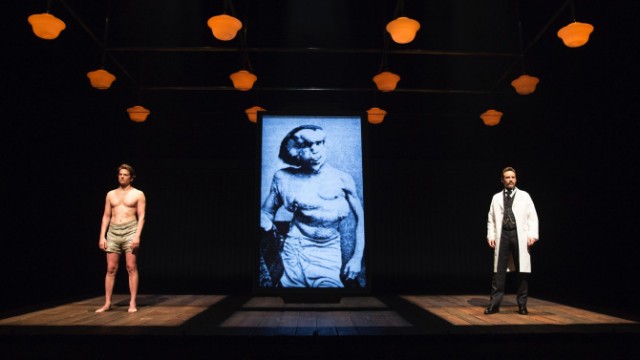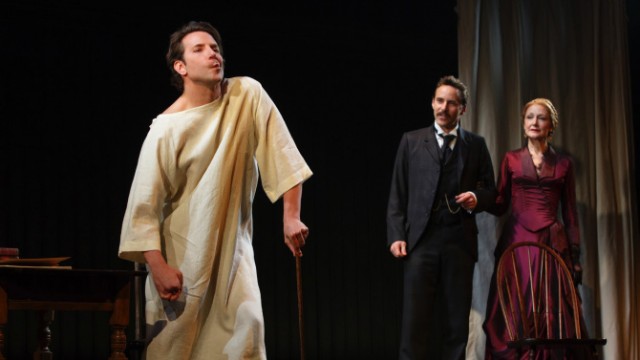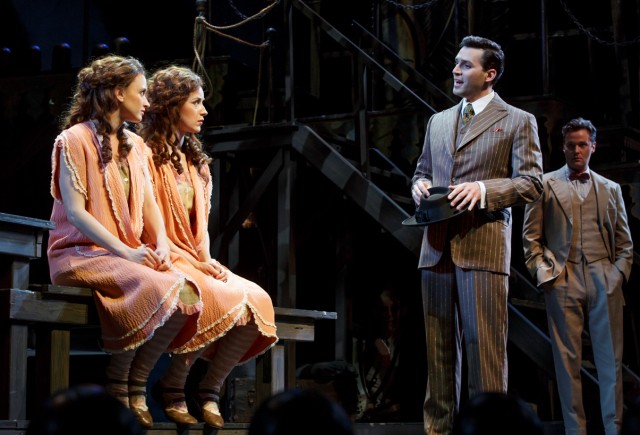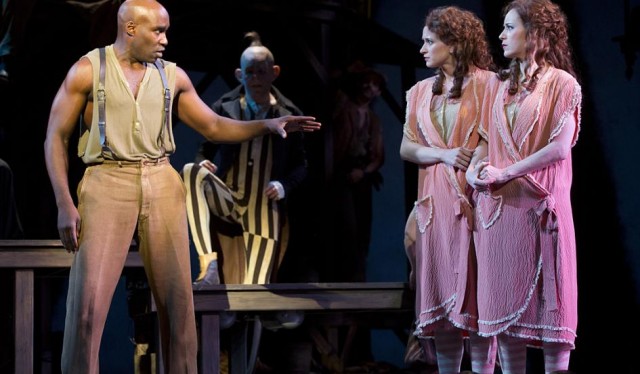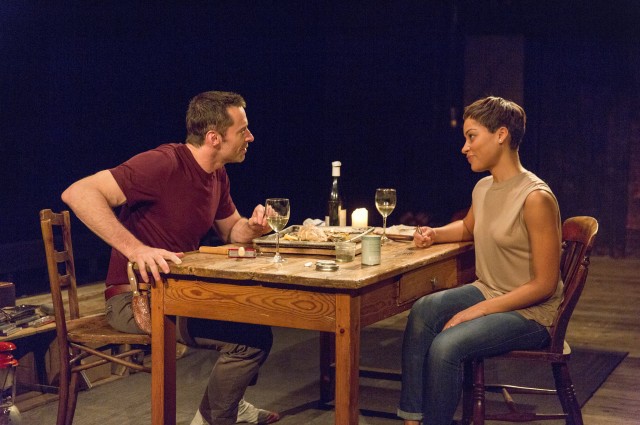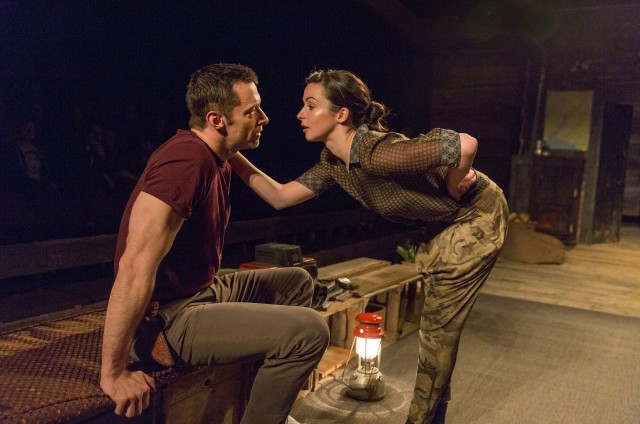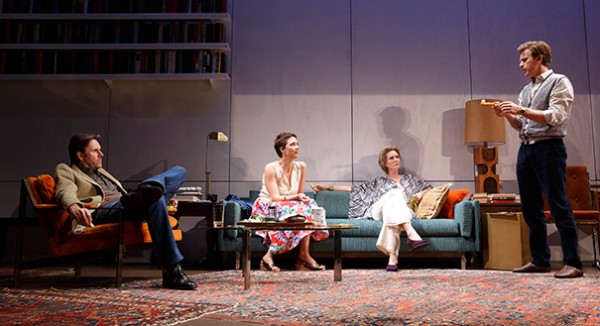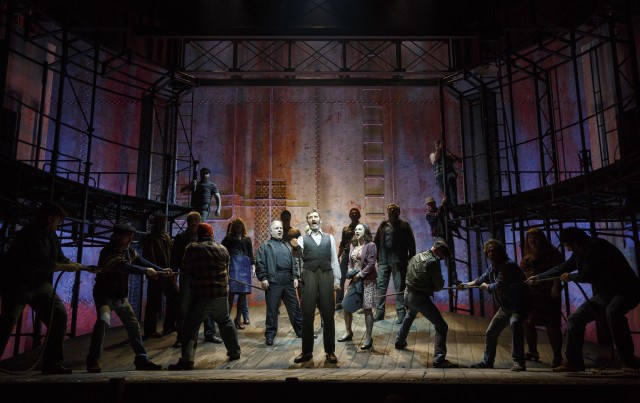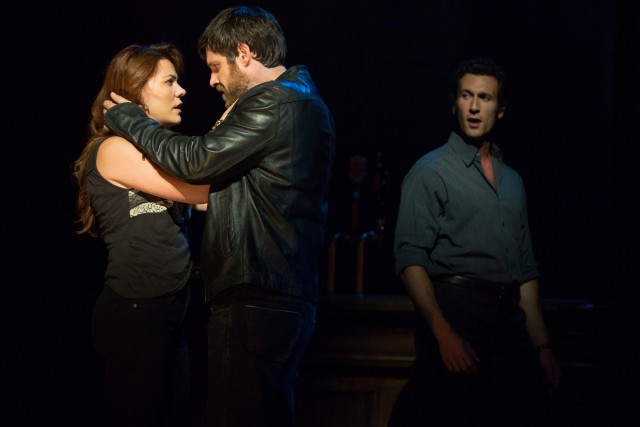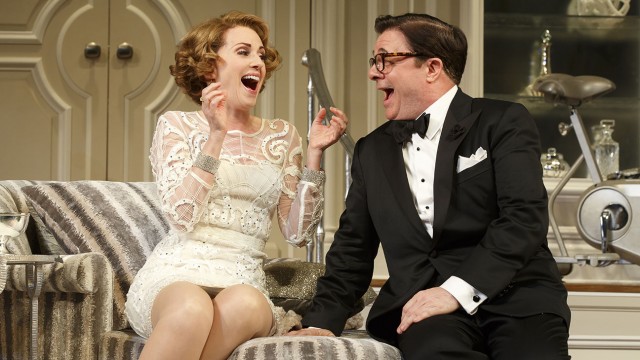
Producer Julia Budder (Megan Mullally) and Hollywood star James Wicker (Nathan Lane) are positively giddy at opening-night party for THE GOLDEN EGG (photo by Joan Marcus)
Gerald Schoenfeld Theatre
236 West 45th St. between Broadway & Eighth Aves.
Tuesday – Sunday through June 7, $72-$147
www.itsonlyaplay.com
Terrence McNally’s latest Broadway show might be titled It’s Only a Play, but oh, what a play it is. In 2012’s Golden Age, the four-time Tony winner (Master Class, Love! Valour! Compassion!) took us behind the scenes of the world premiere of Vincenzo Bellini’s I puritani, and in 2013’s And Away We Go he took us backstage at six different shows in six different time periods. And now, in the Broadway debut of this uproarious comic farce, the inside-joke-laden It’s Only a Play, McNally invites everyone to the opening-night party of The Golden Egg. The festivities take place in the bright and airy bedroom of first-time producer Julia Budder’s (Megan Mullally) luxurious Manhattan townhouse. Designer Scott Pask (The Book of Mormon, The Coast of Utopia) has put the door to the bedroom at the top center of the stage, allowing each character to make a grand entrance — and exit. A who’s who of the New York scene is at “the party of the year for the play of the season,” all ripe for skewering, which McNally and three-time Tony-winning director Jack O’Brien (Hairspray, Henry IV) handle with outrageous grace, leaving no one unscathed, including the audience itself. As the play opens, former Broadway actor and current television star James Wicker (Nathan Lane) enters the bedroom seeking privacy as he calls California to find out the status of his series, Out on a Limb. He encounters Gus P. Head (Micah Stock), a wannabe “actor-slash-singer-slash-dancer-slash-comedian-slash-performance artist-slash-mime” who is taking care of the coats for the evening, which are being collected on Julia’s bed. The endless stream of rapid-fire jokes rat-a-tat right from the start. “What did you think?” Gus asks James about the play. “Wonderful, just wonderful,” James responds, not really meaning it. Gus: “Too bad you’re not a critic.” James: “Tonight everyone’s a critic. You haven’t seen the play?” Gus: “I’m temporary help. This is a one-night stand.” James: “Tonight is a one-night stand for a lot of people.” They are soon joined by aging doyenne Virginia Noyes (Stockard Channing), the drug-addled star of The Golden Egg; Sir Frank Finger (Rupert Grint), its avant-garde director who is tiring of being called a genius; Julia, who is eagerly waiting for the good reviews to roll in so she can add big-time quotes to the marquee; smarmy theater critic Ira Drew (F. Murray Abraham), who has his own agenda; and anxious playwright Peter Austin (Matthew Broderick), who believes in the continuing legacy of the theater. “We have a lot to live up to tonight,” he says ever so earnestly. “It depends on us to remind this city that there is more to Broadway than guest appearances or special effects and revivals or another play from London or another Disney movie made live. We are an original American play. We must make that count for something.”
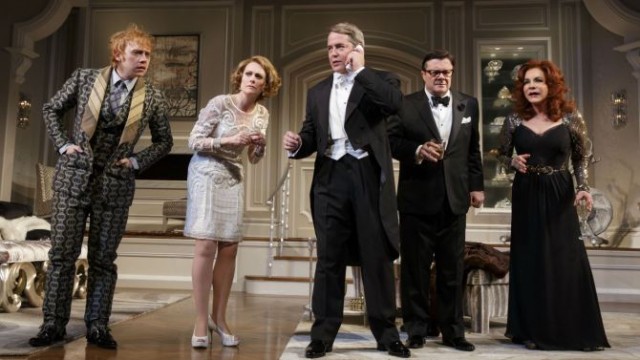
Cast, crew, and friends anxiously await the opening-night reviews for new Broadway show, THE GOLDEN EGG (photo by Joan Marcus)
McNally, O’Brien, and the outstanding cast make that count for a lot in It’s Only a Play, a tongue-in-cheek, and out-of-cheek, riotous evening of theater about theater. The play has been seen in various off-Broadway productions since its 1982 Manhattan Theatre Club premiere, with all-star lineups that have included Christine Baranski, Dana Ivey, Joanna Gleason, and Eileen Brennan as Julia, James Coco and Charles Nelson Reilly as James, David Hyde Pierce and Paul Guilfoyle as Sir Frank, Paul Benedict as Ira, and Željko Ivanek and Mark Blum as Peter. McNally continues to tailor the dialogue to fit his brilliant actors, such as this stinger from the end of James’s early soliloquy: “What’s the word for a mercy killing? Euthanasia? They do it for people, why not plays? But what do I know? What do any of us old gypsies know? I liked The Addams Family.” Lane, of course, played Gomez in that show, a musical adaptation of the television hit, so McNally will likely change that line when Martin Short replaces Lane beginning January 7. (In addition, Katie Finneran will take over the role of Julia, and Maulik Pancholy will play Sir Frank.) It’s a blast to see Lane and Broderick together again, having last lit up the Great White Way as a duo as Bialystock and Bloom, respectively, back in 2001 in The Producers. (As an added bonus, even Lane’s Harvey Fierstein references relate to Broderick too, as Broderick appeared as Fierstein’s adopted son in Torch Song Trilogy.) Abraham (Teibele and Her Demon, A Life in the Theatre) is deliciously droll as the none-too-beloved critic, Mullally (Grease, How to Succeed in Business without Really Trying) is charming as the ditzy, wide-eyed producer, Channing (Grease, Other Desert Cities) is a joy as the bitter former star, Grint (Ron Weasley in the Harry Potter films) is a barrel of energy as the crazed director, Broderick (How to Succeed in Business without Really Trying, Brighton Beach Memoirs) is dryly effective as the serious playwright, up-and-comer Stock (The Capables, McNally’s And Away We Go) is appropriately quirky as the newbie on the scene, and Lane (The Nance, The Iceman Cometh at BAM next month) is, well, Lane as the Broadway actor who sold out to make it in Hollywood. “We need new faces in the theater. New voices, new visions,” Ira says. It’s Only a Play, which is rife with sensational double-takes at all the inside references and hysterical self-needling by its actors (it even pokes fun at The Elephant Man, which is at the Booth next door), might not exactly be filled with new faces and new voices, but its vision is more than welcome in its spectacular Broadway debut.
